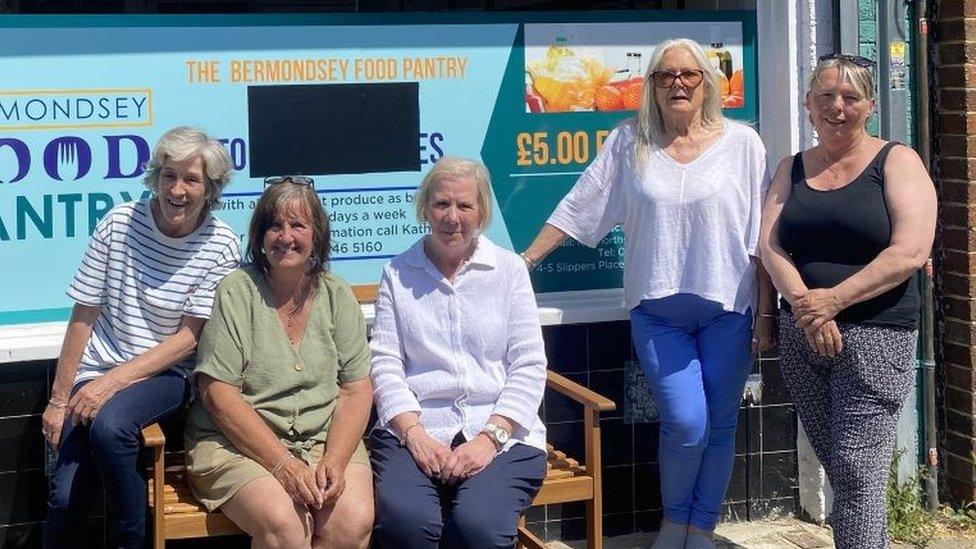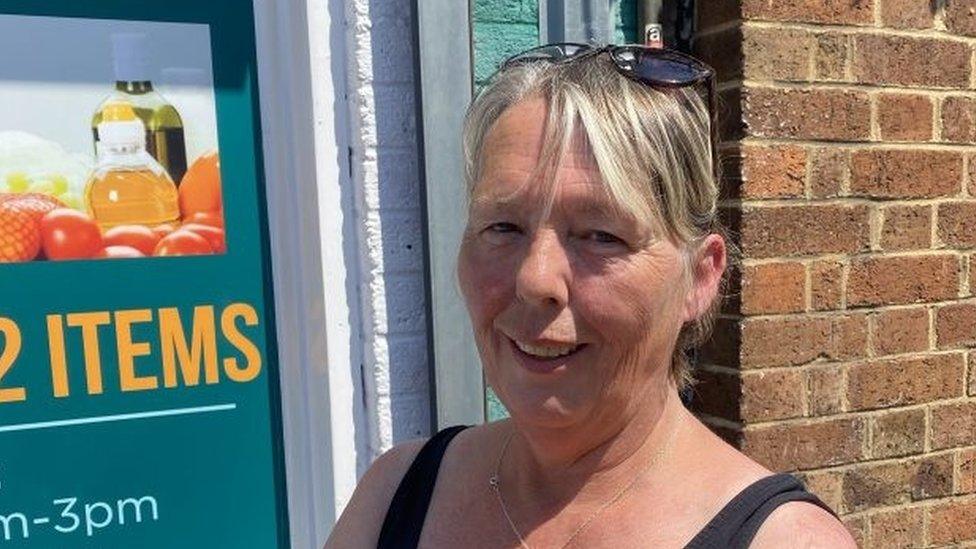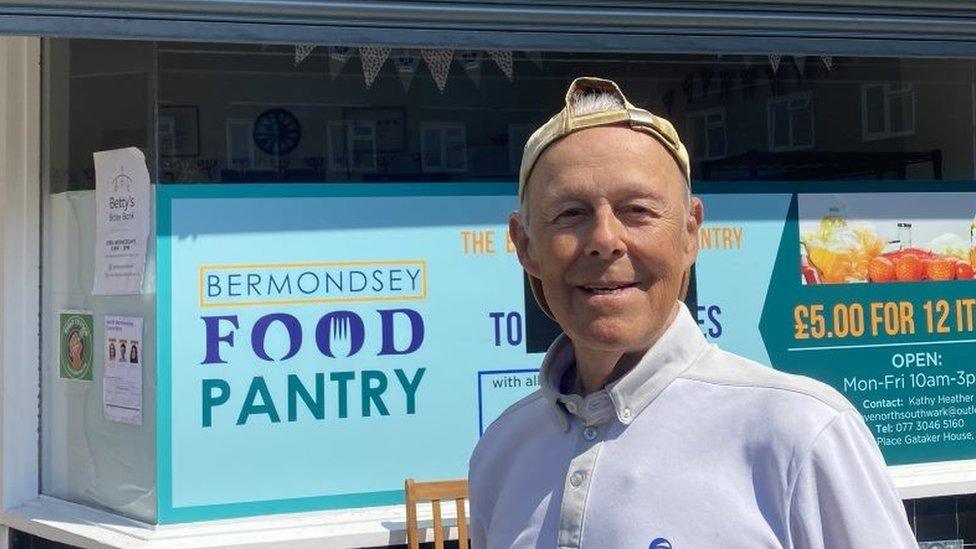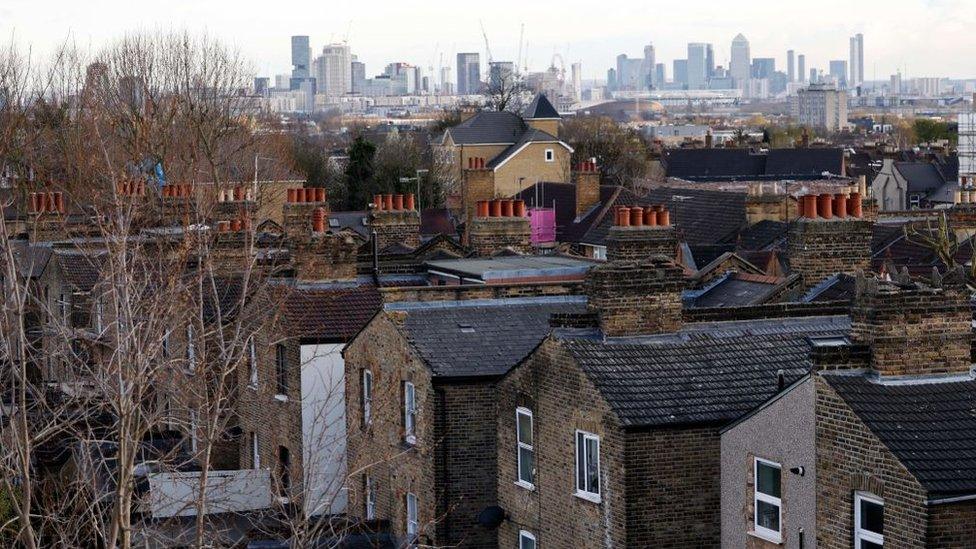Cost of living: Low-income Londoners skipping meals, survey suggests
- Published

Rajeev relies on a baby bank for clothes for his daughter
Almost eight out of ten Londoners on a low income are skipping meals or going without essentials, new data suggests.
The survey, from the Joseph Rowntree Foundation, also suggests Londoners are faring worse than anywhere else in the UK because of high housing costs.
It found 84% of all low-income renters in London are going without essentials, compared to 75% of low-income renters outside of the capital.
A senior economist at the charity said this was becoming the "new normal".
Rachelle Earwaker said: "Over the past year people have been telling us about being unable to afford hot meals, shampoo or a warm shower.
"We are seeing these levels of hardship persist and it has become a horrendous new normal, with over half of low-income households on Universal Credit going without three or more of the essentials that we all need to live."
The charity says high food inflation, combined with inadequate support from Universal Credit, was trapping people in hardship.
One person affected is Rajeev, who works as a senior waiter. He has an almost one-year-old daughter for whom he cannot afford to buy clothes.
He said that after paying £1,200 for rent and between £600 and £700 month on bills, the "month has started and my account is zero".
"What's left over goes to food, then I'm struggling to get clothes for my baby," he said.
To get her these items, he travels 10 miles across London to Betty's Baby Bank in Bermondsey where he can get them free.


Both the baby bank and food pantry are staffed by volunteers
'We don't discriminate'
Betty's Baby Bank was founded by Kathleen Heather, who started helping her community with food parcels in lockdown.
When she saw on a TV documentary people reusing nappies, she couldn't bear the thought of children going without so started the baby bank, situated in the middle of a Southwark housing estate.
She then started collecting her granddaughter's (Betty - the shop is named after her) clothes and asking others to donate any they had.
It's since taken off and demand is increasing so much that she's had to ask people to book appointments.

Kathleen Heather said every month was a struggle to run the baby bank and food pantry
"It has grown, you see more and more people coming every week," she said, adding the services were not means tested.
"We don't discriminate; you can be working and be skint, you can be on benefits and be struggling," she said.
Ms Heather also started the pantry, next door to the baby bank, to provide food to the community at a big discount. It's open five days a week and people can get 12 items including meat, fruit and vegetables for £5.
Ken Blower, who uses the pantry, said it helped him out and made a difference to many who were really struggling with higher utility bills.
"Without it, they'd be really struggling. They're struggling anyway but without it they'd be in trouble."

The Joseph Rowntree Foundation's survey also suggested low-income Londoners were struggling the most with arrears out of any region in the UK, with 62% saying they were behind with at least one bill, compared to 39% overall.
The survey, which was based on interviews with more than 4,000 adults in households in the bottom 40% category of income across the UK and then weighted according to population data, also found:
26% of low-income renters in London were in rent arrears, compared to 16% overall
84% of low-income households with children were going without essentials, rising to nine in 10 for lone parents
27% of all low-income households in London are in energy arrears, compared to 16% overall

Ken Blower says the pantry really helps those who are struggling
The charity is calling for the government to implement an Essentials Guarantee, to ensure the basic rate of Universal Credit covers life's essentials.
A spokesperson for the Department of Work and Pensions said the government was providing "record financial support to those who need it most, with a £94bn cost-of-living support package worth around £3,300 per household".
"On top of this we have raised benefits, including Universal Credit, by 10.1%, increased the National Living Wage and are helping families with essential costs through the Household Support Fund.
"We also remain committed to halving inflation which will ease pressures and help everyone's incomes go further."
But Ms Heather said supporting those in need was getting more difficult and she needed more funding.
"Every month is a struggle because we now have to start paying rent and rates, and that's before the shopping."
However, she said that no matter what, they would be there for the community for as long as it needed them.

Follow BBC London on Facebook, external, Twitter , externaland Instagram, external. Send your story ideas to hellobbclondon@bbc.co.uk, external
Related topics
- Published26 January 2023
